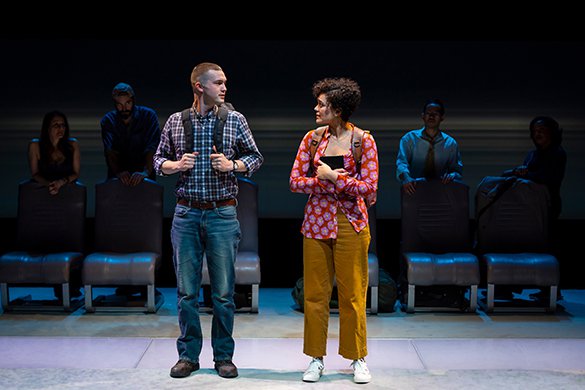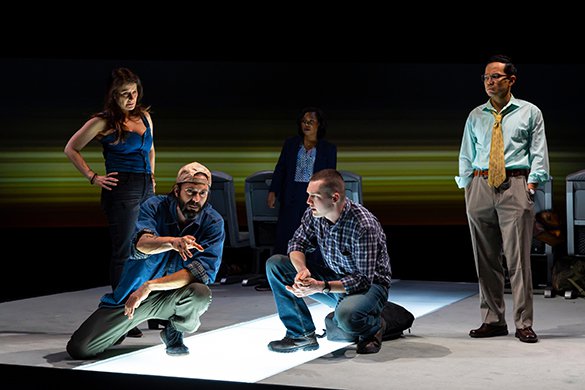
TJ (Will Harrison) and Jane (Camila Canó-Flaviá) consider what might be in The Coast Starlight (photo by T. Charles Erickson)
THE COAST STARLIGHT
Lincoln Center Theater at the Mitzi E. Newhouse
150 West 65th St. between Broadway & Amsterdam Ave.
Through April 16, $103
212-362-7600
www.lct.org
Sliding Doors meets Pirandello’s Six Characters in Search of an Author and the Twilight Zone episode “Five Characters in Search of an Exit” in Keith Bunin’s The Coast Starlight, making its New York City debut through April 16 at Lincoln Center’s Mitzi E. Newhouse Theater.
The ninety-five-minute play takes place on board the Coast Starlight, a real Amtrak train that travels from Los Angeles to Seattle in thirty-six hours. The premise is wholly relatable: Various individuals get on the train and sit in the same car, where they wonder about the identity of their fellow travelers and consider what might happen if they engaged one another in conversation. Who hasn’t been on a train, bus, or plane and thought about who was sitting nearby, thinking about who they might be and maybe even saying hello.
“One day, back in 1896, I was crossing over to Jersey on the ferry, and as we pulled out, there was another ferry pulling in, and on it there was a girl waiting to get off,” Mr. Bernstein (Everett Sloane) says in Citizen Kane. “A white dress she had on. She was carrying a white parasol. I only saw her for one second. She didn’t see me at all, but I’ll bet a month hasn’t gone by since that I haven’t thought of that girl.” There’s an inherent sadness in every fleeting glimpse we humans have of each other, that maybe life would have turned out differently if we had made a different choice in that instant.
For years, Missed Connections listings have appeared, first in newspapers and magazines, now online, from people who saw a stranger somewhere, regret not having introduced themselves, and are now trying to find that person. It was captured beautifully in Adrian Tomine’s November 8, 2004, New Yorker cover depicting a young man and a young woman in aligning subway trains, both reading the same book, looking at each other as if they understand they were meant to be together but might never get the chance.

Characters engage in imaginary conversations in moving play at Lincoln Center (photo by T. Charles Erickson)
In The Coast Starlight, the half dozen characters are all heading somewhere, but it’s not necessarily where they want to be going, and their inner and outer journeys could potentially be changed if only they had said something. “It’s an awful thing to feel like you don’t have a home,” Jane (Camila Canó-Flaviá) says about halfway through.
TJ (Will Harrison) is a navy medic about to go AWOL to avoid being sent back to Afghanistan. Jane is an aspiring animator visiting her boyfriend who she may not love anymore. Noah (Rhys Coiro) is a veteran and a drifter caring for his ailing mother. Liz (Mia Barron) is a loud, lively woman who has just ditched her lover at an Extraordinary Couples Workshop. Ed (Jon Norman Schneider) is a harried, drunk traveling salesman working for a questionable invention company. And Anna (Michelle Wilson) is a married mother who has just had to identify the body of her dead brother.
The play is primarily a series of imaginary conversations, as if the characters decided to speak to one another, sharing intimate details of who they are and what they want out of their daily existence.
“I wanted to lean across the aisle and say to her: I have no idea where I’m headed today — I just decided I’d get on a train and head north,” TJ says about Jane, who responds to the audience, “If he’d told me that, I’m not sure what I would’ve said. TJ: “Then I wanted to tell her: I’ve lived in California for a year and till this morning I’ve never been north of San Diego.” Jane: “And then I probably would’ve said: Well, I’ve never been to San Diego.” TJ: “You should definitely go sometime. It’s totally weird.”
“I wanted to tell all of you: Obviously I’m nowhere near the person I intended to be,” Ed says. “But I’m the only person I can be under the circumstances. I know how shitty today was and I hold no illusions about tomorrow.”
These six diverse people are not having their best day, and they have no idea what the future has in store for them. They are lost souls contemplating what happens next, not necessarily looking forward to it. Worried that he’s going to be caught and brought back to face justice for military desertion, TJ says, “Then I remembered nobody could be looking for me because I wasn’t missing yet.”
A whirlwind conclusion brings it all into perspective, focusing on the concept of “What if?”
Arnulfo Maldonado’s set is a rotating platform with six movable train seats. Daniel Kluger’s sound, Lap Chi Chu’s lighting, and Ben Pearcy’s projections (for 59 Productions) makes the audience feel that they’re also on the train, motoring north through gorgeous scenery, although only flashes of light and color stream by. Ásta Bennie Hostetter’s everyday-dress costumes help give identity to the characters.
Directed by Tyne Rafaeli (Epiphany, I Was Most Alive with You), the play occasionally gets lost itself, the dialogue running off the rails; it’s not clear why the stage spins or why the actors continually rearrange their seats, and Kluger’s interstitial music is too standard.
Harrison (Daisy Jones and the Six) is affecting in his off Broadway debut, speaking in a manner that emphasizes how unanchored TJ is. Canó-Flaviá (Dance Nation, Mac Beth) is warm and gentle as Jane, Coiro (Dinner at Eight, Boy’s Life) is compelling as the unpredictable Noah, and Barron (Dying for It, Domesticated) nearly rips the roof off the Newhouse in her entrance scene, screaming into her cellphone as if no one else is around. Wilson (Confederates, Sweat) is touching as Anna, while Schneider (Once Upon a [korean] Time, Awake and Sing!) does his best with a character who is more tangential, not as deeply nuanced.
At one point Jane imagines telling TJ about James Turrell’s Dividing the Light Skyspace at Pomona College. She explains, “The artist who made it, he believes that the sky is way too enormous for us to really comprehend it. So he builds these little rooms all over the world with holes cut in their ceilings so you can look up at the sky like it’s a picture in a frame. It’s so much cooler than I’m making it sound. I promise you’ll never look at the sky the same way again.”
It’s an apt metaphor for the Coast Starlight, both the train and the play. (Notably, Pearcy was an assistant to Turrell for ten years.) I’ve been on long train rides, and I’ve sat several times in Turrell’s first US Skyspace, Meeting, which is on permanent view at MoMA PS1. I’m not sure that, having seen Bunin’s show, I will be more amenable to engage strangers in conversation, but I’m likely to wonder a whole lot more about who they might be.